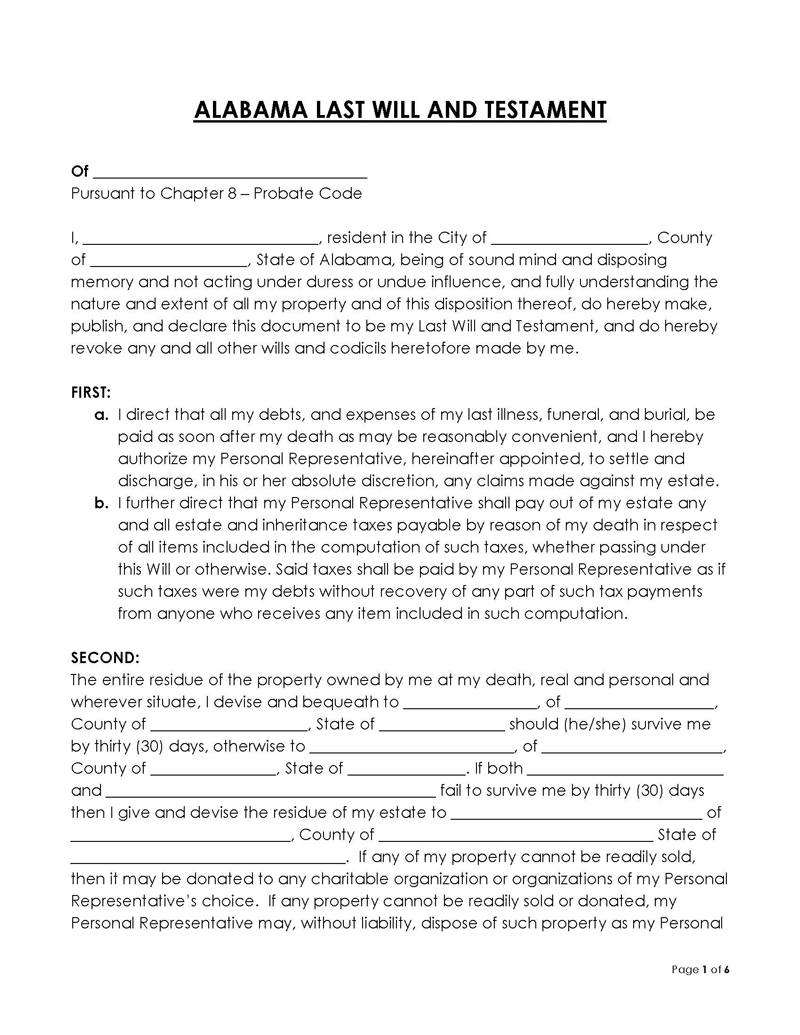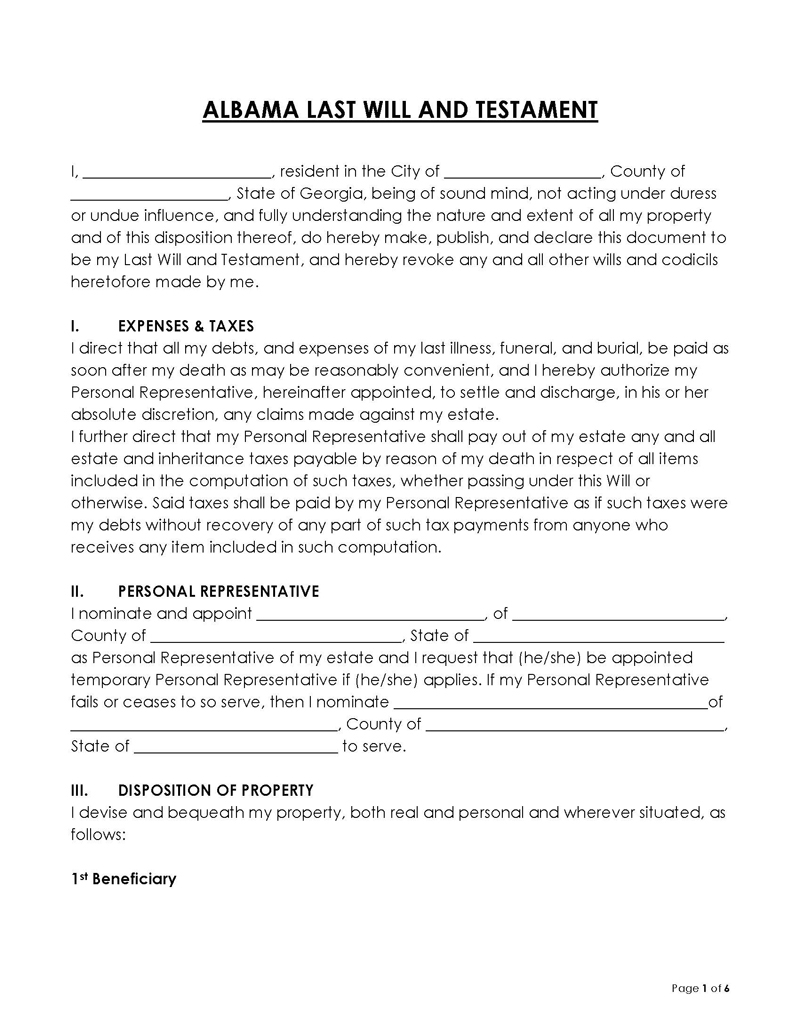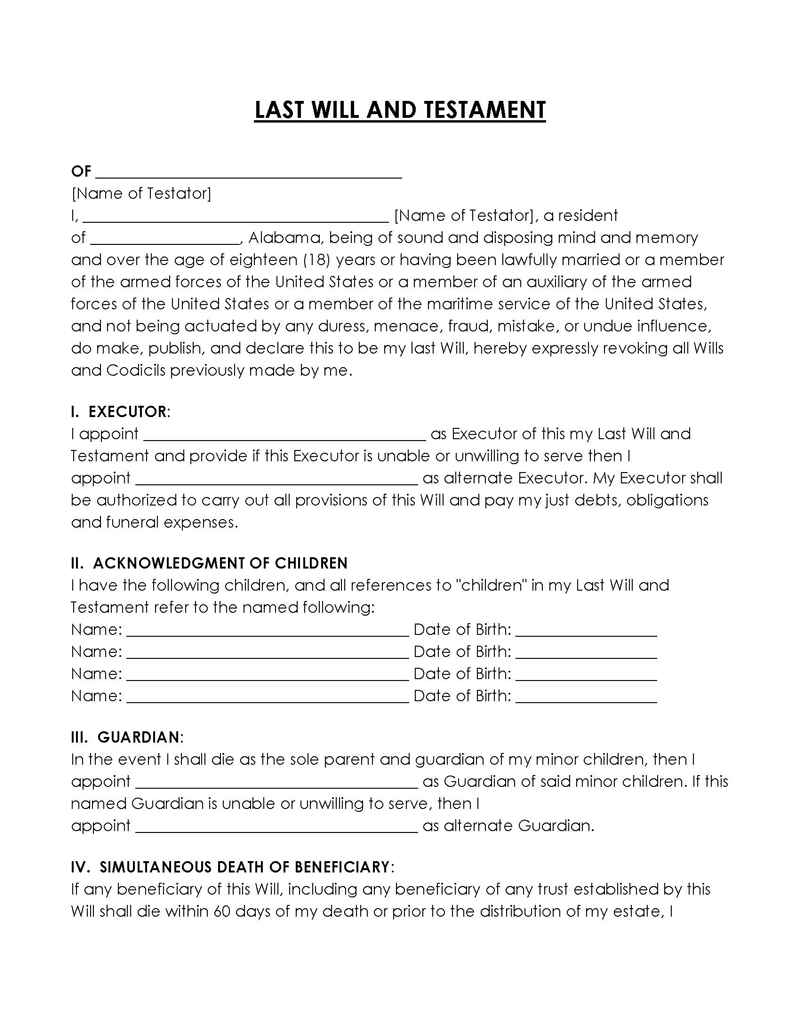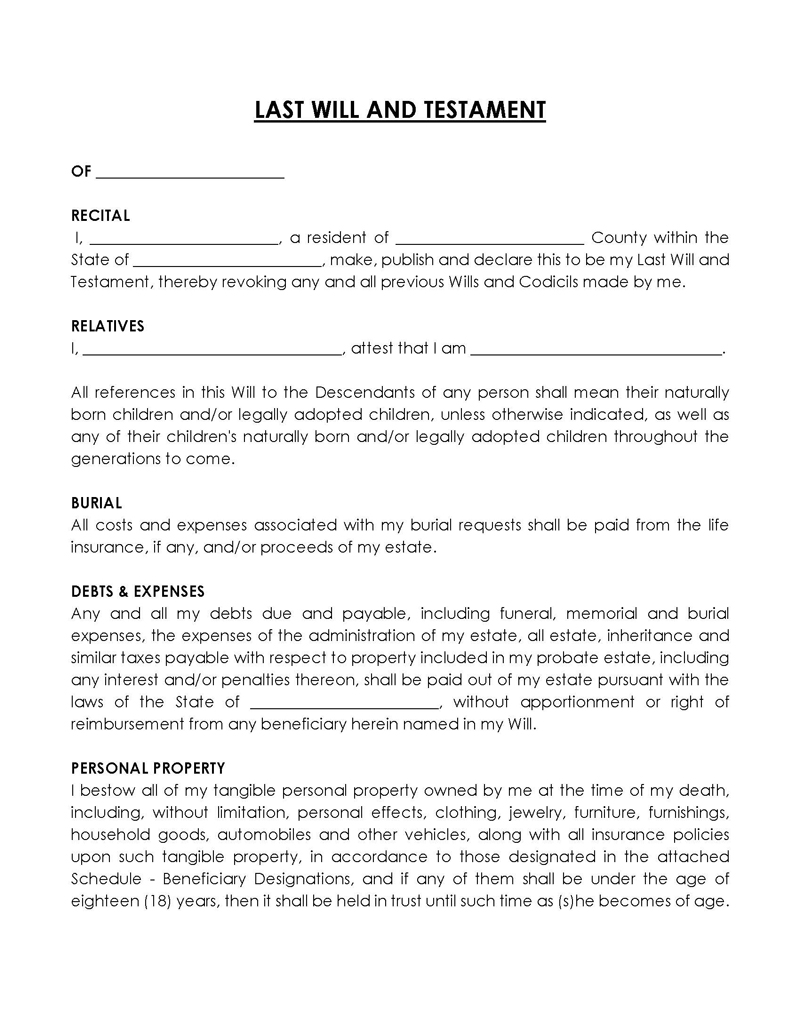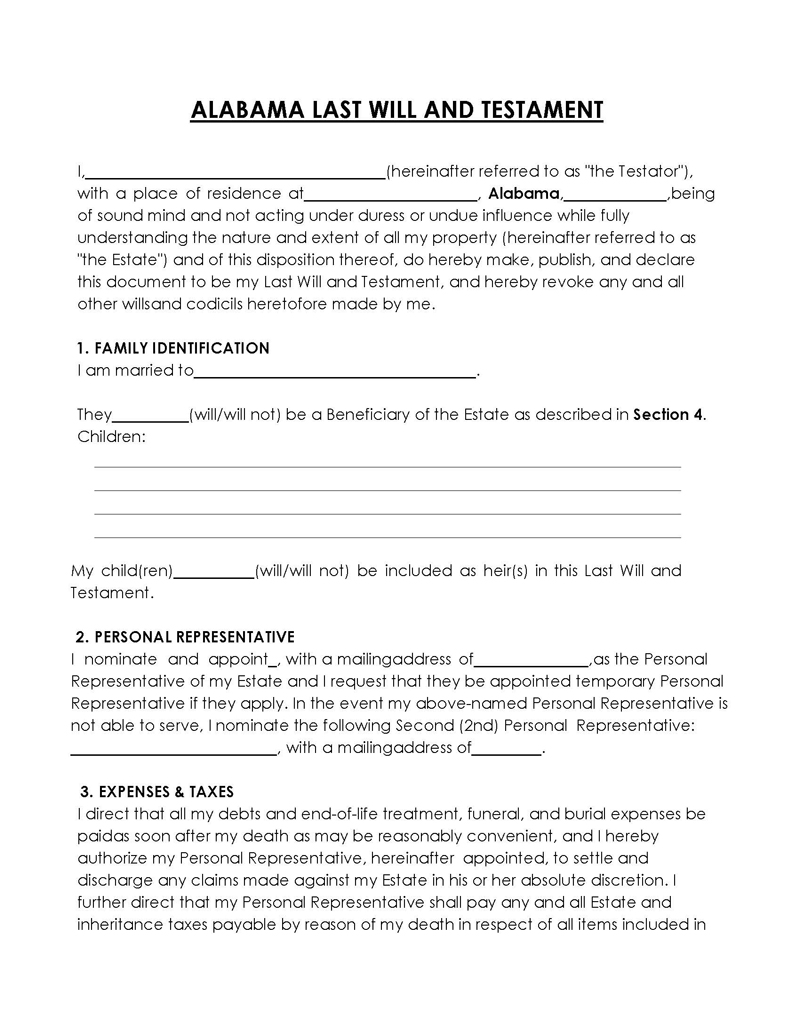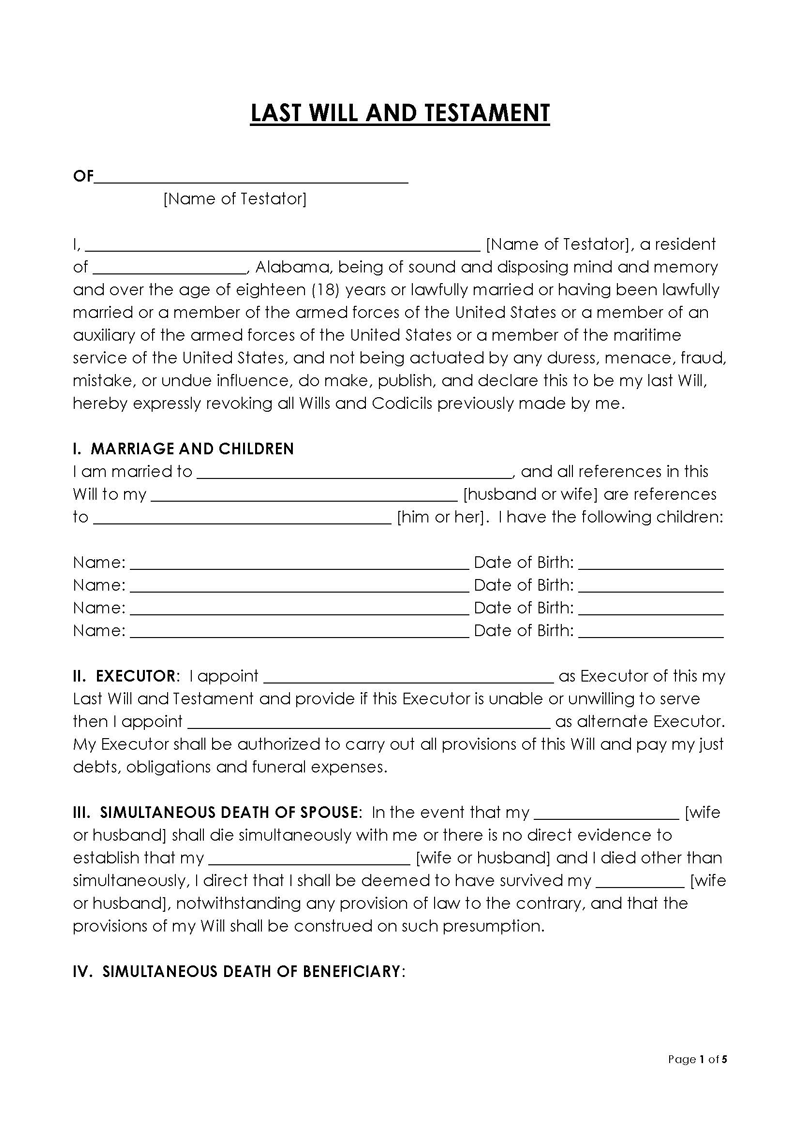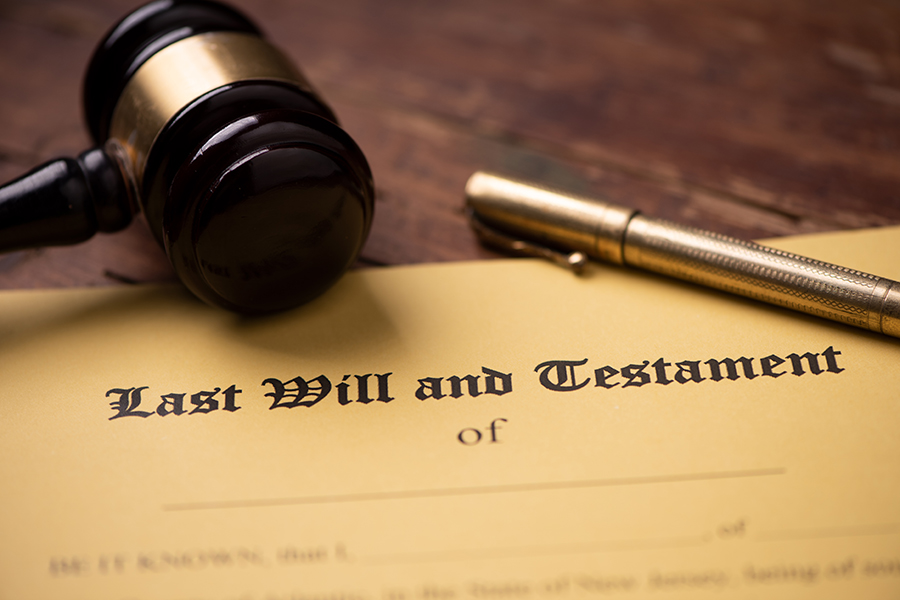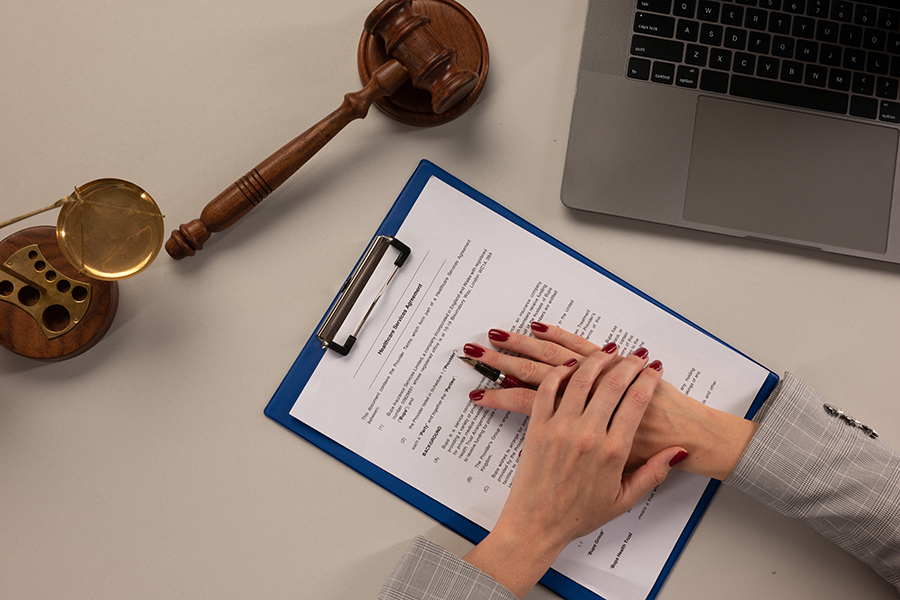A last will and testament in Alabama, also known as the last will, is a legally binding document that states how assets will be distributed and who is entitled to the property when someone dies.
The will’s owner is called the testator. This will also appoint an executor, who manages the distribution of the estate after the death of the testator. Beneficiaries may be members of the family, close friends, organizations, or other individuals.
Fundamentally, one of the most significant and essential actions a person can take to ensure their assets will be protected in the event of their death is to make an estate plan. If you do not prepare an estate plan, you cannot decide how the property and possessions that you worked so hard for are distributed.
Alabama residents can make a last will to prepare for the future. According to Alabama law, it must be signed by the testator and two witnesses in order to be legally enforceable. The will can be notarized even though it is not mandatory.
This article discusses the basic requirements for a last will and testament in Alabama and its importance.
Laws and Requirements for Making a Will in Alabama
The laws governing last wills are different in each state; therefore, it is important to know the precise laws for Alabama. When the last will is executed, it becomes subject to dispute if it does not follow the state’s laws and requirements. This can result in conflict between beneficiaries.
The laws and requirements of valid last will include the following:
Statute and definitions
A last will in Alabama is governed by the statute Alabama Code Title 43 Wills and Decedents/Estates Chapter 8—Probate Code. It must first meet the requirements set forth in Section 43-8-1 of the Alabama Code for a “will” in order for the state to recognize it as such. A “will” includes a codicil and any testamentary instrument that merely appoints an executor or revises or revokes another will.
Age of testator
Under the laws in this state (§43-8-130), anybody below 18 years cannot be recognized as the testator of a will. They must be 18 years of age or older, or an emancipated minor, and of sound mind. A sound mind implies that they must be able to comprehend the implications of making a will and the extent of their estate, and they must know to whom they want to leave their property.
Age of witnesses
Wills in Alabama are required to be witnessed and signed before two eligible witnesses who attest that the signing was voluntary and not as a result of any undue influence or constraint (Ala. Code §43-8-134). Anybody in the state who is legally qualified to testify as a witness may serve as a witness. The will must be signed by the testator and each witness (Ala. Code 43-8-131).
Exceptions to the ability to distribute property
In Alabama, there are some circumstances under which property cannot be distributed by means of a last will. Restrictions are imposed on the following properties:
- Property under the joint tenancy with a right of survivorship should go to the surviving owners and thus cannot be conveyed through a last will.
- The elective spousal share – is a claim to the property by one spouse that is based on that spouse’s contributions to the acquisition of marital property or survivorship as a spouse.
- Benefits under a life insurance policy should be paid to the designated beneficiary, and a will cannot contest this.
- Property exceptions can be granted when a surviving spouse or children (in the absence of surviving spouse) residing in Alabama are entitled to a $3500 share in automobiles, furniture appliances, household furniture, and personal effects.
- In the case of homestead allowance when the surviving spouse or children (in the absence of surviving spouse) living in Alabama shall inherit an allowance of $6000.
- In the case of a family allowance when the surviving spouse or children (in the absence of surviving spouse) residing in Alabama are entitled to a monetary family allowance which will be determined by the court.
Self-proving will
It is acceptable to self-prove a last will in Alabama under Ala. Code § 43-8-132. However, it is not legally required. Self-proving a will reduces the likelihood of it being challenged in court.
Handwritten, oral, and holographic wills
In Alabama, there must be a paper copy of every valid last will. Electronic wills (e-wills in any digital format such as audio, video, etc.), oral wills, and handwritten wills might be recognized in Alabama if they are witnessed in accordance with state laws. Unwitnessed holographic wills are not recognized.
Signing requirements
The document has to be signed by the testator and two witnesses; otherwise, it would not be enforceable within the state, according to Ala. Code §43-8-131. The will must be signed by the testator or another person on behalf of the testator, under his direction, and in his presence. The witness must be disinterested, which means that they have no claim to anything from you or your estate.
It is best to appoint witnesses who are younger than you to provide some assurance that they will be available if the will is challenged. In addition to the signatures, signatories must provide their full names and addresses. The last will can have a notary public’s signature if notarized.
Probate and intestacy laws
The decedent’s property can be distributed by one of two legal means: by leaving a valid last will or through intestacy. To be valid in Alabama, the last will should undergo proper probate procedure, which requires the will to be filed with a probate court. Probate is the legal procedure by which an estate is distributed after the death of the testator.
An executor or administrator oversees the estate’s assets in Alabama during the probate procedure. Before the estate is distributed to its beneficiaries in accordance with the terms of the will, this includes paying any outstanding debts, taxes, and other obligations. State law regulates the estate distribution process as well as the probate process.
Intestate succession is where the property of a person who has died without leaving a valid last will is distributed by virtue of the law of descent and distribution. This results in an inheritance being distributed to heirs according to their relationship to the decedent. Intestate law dictates that the estate passes to the surviving spouse if no descendants or parents survive the testator.
The decedent’s parents receive the remaining intestate property in the absence of a surviving spouse and descendants. If both parents have passed away, it goes to the siblings of the deceased. When both the decedent’s parents and siblings have also passed away, it goes to the next of kin under the following priority, starting with grandparents, aunts, uncles, first cousins, and so forth. If there is no next of kin surviving, the state will receive the property.
It should be noted that if there are surviving children from the marriage, the spouse receives $50000 in property value in addition to half of the remaining estate under the intestate laws. If all of the deceased person’s children are still alive, the remainder of the estate, after the surviving spouse receives their share, is divided equally among them.
How to Revoke or Change a Will in Alabama
An individual who has executed a will may revoke their previous one by drafting a new one if they no longer wish to be bound by it, they are unhappy with the terms of their previous will, or they were pressured into making it. The new last will revoke all prior wills and codicils and must be in writing (Ala. Code § 43-8-136). Alternately, you may burn, tear, annul, or obliterate the will yourself, or you may have someone else do it in your presence.
Also, note that upon divorce or marriage annulment, any provision in the last will naming the spouse as a beneficiary, executor, or trustee is revoked unless the will specifically states that such changes should not affect the stipulations of the will (Ala. Code § 43-8-137).
Why Do You Need a Last Will and Testament in Alabama?
One of the most meaningful documents you will ever write is your will. A last will allows a testator to decide how their estate, or inheritance, is divided among their heirs after their demise and names an executor to manage the distribution of property. This way, disputes regarding intestate succession can be avoided. In a will, you can also specify who should adopt any children or pets you have, as well as the nature and location of any funeral or memorial service that should be held.
In your will, you also designate guardians who will take care of your kids and make decisions for them if they become too young to do so on their own. If you have both a living spouse and other children, such as stepchildren, you can choose which ones should inherit if your spouse is not alive when you die.
A last will also allows you to name a legal representative for your estate. This person is known as the executor or, if a woman, the executrix. The executor oversees the distribution of property after the death of the testator. Without this document, an administrator appointed by the court will handle this process.
A last will can be written by a lawyer or even drafted by you without the aid of an attorney, but it should always be properly signed in order to be legally effective.
Free Templates
Frequently Asked Questions
You do not require a lawyer to make your last will if the contents of your will are simple. However, if you want to appoint guardians or provide for children from previous relationships, or someone who is not your direct descendent, you may need legal advice.
Naming a personal representative is highly recommended, as it expedites the probate process.
No, notarization is not required in Alabama to make a legally valid last will. You can, however, notarize it whenever you want. A notarized or self-proving will expedite the probate process.
Yes, you can exclude any person from the will if you wish. However, in the case of a spouse, they may be entitled to a certain minimum bequest by law.
Yes, you can change the terms of your last will in the future. However, if there are changes that affect people who were named as beneficiaries, individuals who were named as executors, or witnesses, these changes must be witnessed by at least one other person.
If a will is lost, the state of Alabama can still recognize it. It is also not uncommon for an original will to be lost, but a photocopy of it can be produced. The state operates on the presumption that the will was annulled unless proof of the last will in question can be presented in court. The photocopy this meets the requirements for acceptance; however, the photocopy’s proponent still needs to refute the assumption that the original will was misplaced or destroyed with the intention of revoking it.
